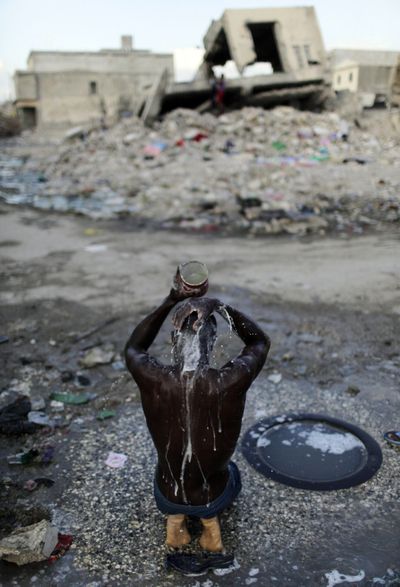Officials suspect cholera has entered Haiti capital

PORT-AU-PRINCE, Haiti – A 3-year-old boy from a Port-au-Prince tent city was confirmed by health authorities to have cholera Monday, proving Haiti’s growing epidemic has spread from outlying areas to the country’s crowded capital.
The confirmation raises the peril for an estimated 2.5 million to 3 million people in the city, nearly half of whom have been living in tents or under tarps in easily flooded encampments since the Jan. 12 earthquake destroyed their homes.
Samples from more than 100 other patients in the capital were being tested for cholera. The outbreak has already killed at least 544 people in Haiti, Health Ministry Executive Director Gabriel Timothee told the Associated Press.
The boy was tested after being taken to a hospital Oct. 31 suffering from severe dehydration, nausea, vomiting and diarrhea. He was treated with oral rehydration, IV fluids and antibiotics and released.
A stool sample tested by Haiti’s national laboratory contained vibrio cholerae 01, the bacteria causing the disease, the chief medical officer, Dr. Antonia Eyssallenne, confirmed to AP. The boy’s family had not traveled in more than a year or had contact with anyone from the Artibonite Valley, where the epidemic was first registered.
Timothee said many of the patients hospitalized in the capital with cholera are believed to have recently arrived from the Artibonite Valley, an agricultural area where more than 6,400 of Haiti’s known 8,138 casese have been recorded.
Since its discovery in late October, the disease has spread to half of Haiti’s 10 administrative regions, or departments. More than 200 people have been hospitalized in the West department, where Port-au-Prince is located, but no cases of cholera have yet been confirmed within the limits of the capital city.
Cholera had never been documented in Haiti before its appearance last month.
In little more than three weeks it is suspected of infecting tens of thousands of people, though only about a quarter of people infected normally develop symptoms of serious diarrhea, vomiting and fever. Nearly 4 percent of the thousands hospitalized have died, most from extreme shock brought on by dehydration.
Officials are concerned that floods triggered by Hurricane Tomas on Friday and Saturday could exacerbate the spread of the disease, which is transmitted through the consumption of fecal matter contained in contaminated water or food.